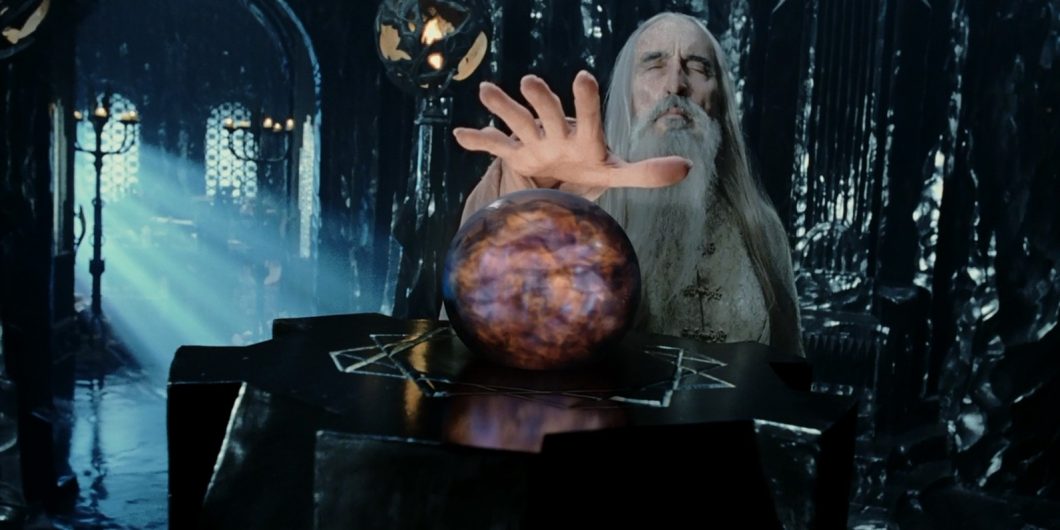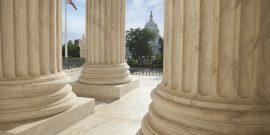Tolkien, the Mob, and the Demagogue
Among other things, J.R.R. Tolkien’s Lord of the Rings is about power, or perhaps better put, it is about domination, manipulation; and, the unavoidable corrupting influence of power on the human soul. One lesson to draw from Tolkien’s epic is that no one should exercise power for too long—it is radioactive, no matter how wisely and benevolently employed.
Many have eagerly promoted the One Ring as an analogy for dictators, autocrats, or even nuclear power. Tolkien warned, however, that his book was not an allegory but a myth: attempts to locate a one-to-one correspondence between elements in the story and contemporary life are, to use Flannery O’Connor’s rebuke to those who tried to read too much into her stories, “straining the soup too thin.” Rather, as Tolkien explained, the Lord of the Rings is first and foremost a book to be enjoyed; but at the same time, like any rich and wise literature, there are applications to be made and lessons to be drawn.
It may come as a surprise that, if Lord of the Rings suggests a warning about political systems, it is not about one-man rule: after all, the novel celebrates “unconstitutional” hereditary monarchy as the ideal government for Middle Earth, hence the title of the last third of the book, “Return of the King.” In this, Tolkien follows Aristotle that monarchy is the ideal government—provided the right king or queen is available, an admittedly difficult prospect. It is not easy to find an Aragorn.
Tolkien also writes approvingly of a natural aristocracy, if indirectly, in his important chapter, “The Council of Elrond,” where the best minds of Middle Earth acknowledge the threat of Sauron and develop a strategy to destroy the One Ring. An approving view of aristocratic wisdom is evident much later in the book, if to a lesser extent, in the chapter “The Last Debate,” where, once again, a small but elite group hold a war council and plan a diversion that might give Frodo and Sam the best chance to destroy the Ring. More philosophically, they consider the nature of the evil that they confront and the need to be prepared for the next assault, in whatever form it might appear, even if Sauron, the immediate Middle Earth threat, is vanquished.
But if there is one form of government of which Tolkien seems to disapprove in the Lord of the Rings, it is democracy. He once wrote to his son Christopher, that democracy is “nearly equivalent to ‘mob-rule’” and that “Greece, the home of philosophy—did not approve of it” because it too often slipped into dictatorships. In this, Tolkien echos the concerns of the architects of the 1787 U.S. Constitution who explained in Federalist Papers #10 and #14 that the new Constitution did not form a democracy but a republic. Like Tolkien, Publius recalls the “turbulent democracies of ancient Greece.”
Tolkien’s warning is on vivid display in what may be the most remarkable chapter of the entire book, “The Voice of Saruman.” In this episode, Saruman, once the chief of Middle Earth wizards, has, to his peril, studied too deeply the “arts of the Enemy,” as Gandalf explains, and has become Sauron’s point man. In that role, Saruman has created and equipped a sinister Orc army, even breeding a super race of ghastly Orcs called the Uruk-Hai.
After Saruman is defeated by the Ents, a group of ancient anthropomorphic trees who flood his headquarters at Isengard, an array of leaders approach the tower to confront the corrupted wizard. The delegation consists of Gandalf, Aragorn, Legolas, Gimli, King Theoden of Rohan, and a contingent of Rohan’s horsed soldiers. What then transpires is a startling display of demagoguery, the bane of democracies.
By this time Saruman’s army, months in the making, is crushed and Saruman’s headquarters are in ruins. He should have no influence at all and one would expect him to seek mercy or at least acknowledge defeat. Yet Saruman as demagogue is undaunted, however counterfactual his rhetoric might be: His is a “post-truth” strategy. As Gandalf and the group approach Orthanc, Pippin naively asks, “What’s the danger? . . . Will he shoot at us, and pour fire out of the windows; or can he put a spell on us from a distance?” Gandalf explains, “Saruman has powers you do not guess. Beware of his voice!”
Indeed, when Saruman appears in the tower and speaks to those below, his voice is such as to flatter and stir the delegation to thoughtless sentiment: it was “low and melodious, its very sound an enchantment.” The narrator continues:
Those who listened unwarily to that voice could seldom report the words that they heard. . . . Mostly they remembered only that it was a delight to hear the voice speaking, all that it said seemed wise and reasonable, and desire awoke in them by swift agreement to seem wise themselves.”
By contrast when those who confront Saruman speak “they seemed harsh and uncouth by contrast. . . For some the spell lasted only while the voice spoke to them;” for others, the effect perdured.
Tolkien continues,
For many the sound of the voice alone was enough to hold them enthralled; but for those whom it conquered the spell endured when they were far away, and ever they heard that soft voice whispering and urging them. But none were unmoved; none rejected its pleas and its commands without an effort of mind and will, so long as its master had control of it.
Anticipating our own age of victimization, Saruman plays the part of the aggrieved victim—no longer the aggressor—because of “the injuries that have been done to me.” Nonetheless, with pseudo-magnanimity, he offers to rescue the men from the ruin to which they are headed under Gandalf’s leadership: “Indeed I alone can aid you now.”
Though some are unaffected, the rank and file are vulnerable, and to be sure, they are Saruman’s intended audience along with their King Theoden, who was once in thrall to his palace Rasputin, the aptly named Wormtongue. The men are simultaneously soothed by Saruman, yet unsettled by fear as Saruman predicts the demise of the “Mark,” the Riders of Rohan, if they do not change their allegiance to him:
The Riders stirred at first, murmuring with approval of the words of Saruman; and then they too were silent, as men spell-bound . . . And over their hearts crept a shadow, the fear of a great danger: the end of the Mark in a darkness to which Gandalf was driving them, while Saruman stood beside a door of escape, holding it half open so that a ray of light came through.
Saruman then offers an opportunity for peace and reconciliation as he asks King Theoden, “Will you have peace with me, and all the aid that my knowledge, founded in long years, can bring?” The implication is that, if Theoden declines to accept Saruman’s offer of peace, it is Theoden who will be divisive. This would seem an implausible tactic—were it not so familiar in contemporary politics. Viciously slander and undermine your political opponent, and then publicly offer to salve the wounds that you yourself have inflicted, all the while condemning “the politics of personal destruction.” Saruman, moreover, is as capable of “spin” as any modern-day political consultant. His hideous Orc army’s failed attack on Rohan is repackaged as “valiant men” who “have fallen in battle.”
Tolkien offers no recommendations for institutional structure or political processes as does Publius to combat the slippage of a republic into the excesses of a democracy. Yet he may offer something more valuable, namely, hope
How might we guard against demagoguery and the vulnerability of so many to its allure? Again in the Federalist Papers, Publius thought the size of the republic would dissipate the ability of any one group to grow into a mob and violate the rights of others. In addition, government by elected representatives and appointed offices would serve as a buffer to avert the “confusion of the multitude” and render it more “difficult for unworthy candidates to practice the vicious arts.”
The ability of social media, however, to focus and mobilize the self-righteous, the indignant, and the unforgiving, especially the “Twitter Mob,” as it is often called, may have done more to push the country toward the baneful effects of a “pure democracy” than anything in recent memory. For example, a senator who made a travesty of a recent Senate Judiciary Committee hearing rationalized his tactics by reference to the prevailing mood of his Twitter feed. We can only hope that the republic has not met its match. It was Abraham Lincoln, in his “Young Men’s Lyceum Speech,” who warned that if the country is to meet its demise, it will not be vanquished from without. If it is to fall, it will be defeated from within.
Tolkien offers no recommendations for institutional structure or political processes as does Publius to combat the slippage of a republic into the excesses of a democracy. Yet he may offer something more valuable, namely, hope. As I have written, Tolkien elucidates the complexity of this rich virtue in his fiction. He once explained to W.H. Auden in correspondence that he experienced “a terrible recurrent dream” in which he saw a “Great Wave” sweeping across the landscape, destroying everything in its path. After his son Christopher reached adulthood, the two discovered that Christopher had experienced the same dream. In Lord of the Rings, Tolkien bequeaths that dream to Faramir, the second son of Denethor of Gondor. Faramir explains the dream to Éowyn of Rohan while both are recovering from battle in the Houses of Healing. He describes a “great wave climbing over the green lands and above the hills, and coming on, darkness unescapable. I often dream of it.” A troubled Éowyn asks, “Then you think that the Darkness is coming? Darkness inescapable?”
But Faramir’s response is encouraging: although he admits that on an intellectual level he might conclude “that great evil has befallen and we stand at the end of days.” Yet he confesses that in his ignorance, he has no justification for thinking the worst: “I do not know what is happening.” Accordingly, he chooses to respond to another faculty, and in this we should find encouragement: “ But my heart says nay; and all my limbs are light, and a hope and joy are come to me that no reason can deny.”



